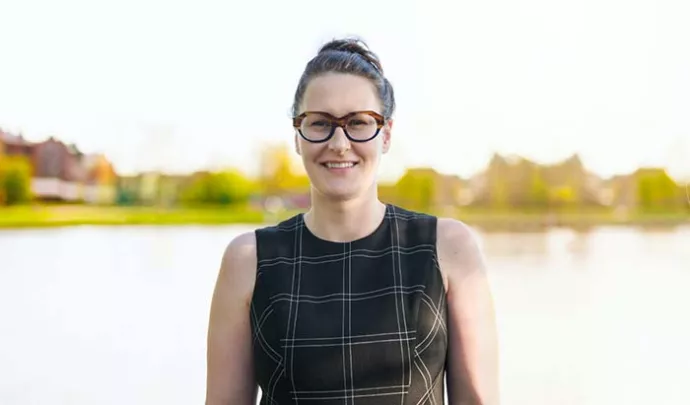This text address is also available as a downloadable PDF.

Boozhoo and greetings, all: thank you for being part of the events today.
Since my appointment as Vice-President and Principal in May 2020, I have reflected now and then on the meaning of the University of Toronto Mississauga’s Latin motto: tantum nobis creditum, so much has been entrusted to us.
The motto sticks with me because it expresses the sense of privilege, responsibility, and reciprocity that should animate the university’s highest ideals. UTM has been entrusted with educating generations of critical thinkers and courageous innovators; with discovering research solutions to pressing problems; with stewarding the natural environment toward a sustainable future; with building stronger communities of wellbeing and justice; with listening to the truth that comes before reconciliation and working to be good kin to one another.
These responsibilities inhere in Mississauga’s landscape and its deep history. I greet you today from Lislehurst, the Principal’s residence at UTM, which sits on the traditional lands of the Wendat and the Seneca, on the territory of the Mississaugas of the Credit First Nation: chimiigwetch to the Mississaugas of the Credit for joining today’s ceremony and for their generosity, guidance, and continued friendship, for which much is owed. One of Lislehurst’s windows looks out over the Credit River, so called by French and British colonists because at the river’s mouth, they traded goods on credit with Indigenous peoples, who had travelled and stewarded these waters from time immemorial. The same history of contact and credit is engrained in the river’s Eastern Ojibwa name, Missinnihe: the trusting creek. And it resonates in turn with UTM’s Latin motto in the word creditum, as a commitment that will ground my term as Principal. I hope to live up to the trust you have placed in me.
I also hope to live up to an opportunity enabled by my predecessors. I’m the first woman at UTM appointed to the position of Principal, a distinction that reflects less on my ability, than on the strength of women who fought for the right to work, learn, and lead before me – who sought credibility, irrespective of gender. I draw inspiration from my late grandmothers, Loma Fieldes and Iris Gillespie, who back in my home in Aotearoa-New Zealand, would often tell me that they had longed to go to university—but were not permitted by their families to do so. Along with my parents and my late aunt, Dr. Mary Ann Fieldes, a Professor of Biology here in Ontario at Wilfred Laurier University, my grandmothers raised me as fierce supporters to believe no educational opportunity should be or would be inaccessible to me.
When I think about that word, credit, I remember the women of my family and the hope and trust they put in me. I also find myself remembering moments from my own scholarship. I am a researcher of premodern books, texts, and textual technologies; the first time I ever paused to think about the word, credit, I did so because I was interested in the way it is used by Margery Kempe. In the early fifteenth century in England, Kempe shared her story, the first autobiography in English.
She recited her life’s events to a priest, who was, unlike here, literate: who could write her story down. She did so as she put it, to give “credens to hir felingys,” where the Middle English word credens means both a stable, trustworthy belief and a stable, trustworthy document: the Book of Margery Kempe itself. Kempe’s story is one of repeated efforts to unsettle the assumptions of a patriarchal clergy; to give voice and substance to her extraordinary revelations; and to make her distinct, non-conforming experiences as worthy of credibility as that of any of her male contemporaries. The trust that I now enjoy, as a female leader at Canada’s best university, arises 3 because women like Margery and my grandmothers, along with so many queer women, women of colour—worked so hard for credence—and refused to settle even after they earned it.
I intend to use my privilege in the same spirit of determination and improvement. I commit to being an advocate for the University of Toronto Mississauga; for its mission of excellence in research and teaching; for its capacity to become an even more inclusive place, especially to disenfranchised people and marginalized voices. I intend to ground that advocacy in a commitment to listening, to valuing conversation and empathy as the foundation on which UTM rests. Those conversations will continue to make a difference because UTM comprises so many outstanding people—students, staff, faculty, librarians, alumni, community partners, including our Indigenous partners, to whom I’m so grateful.
Those outstanding people—you!—enable UTM to practice pedagogies of kindness and make world-leading research discoveries. You advance sustainability goals and drive public health initiatives for the common good; you support physical, mental, and social wellbeing; you share knowledge that allows us to sit with truth. UTM has a huge capacity to fulfill the lofty responsibilities embedded both in our Latin motto and in the history of the land on which we now work. Alongside the Missinnihe, on the campus at UTM, so much has been entrusted: I look forward to working with you to make good on our credit.
Alexandra Gillespie
Vice-President & Principal
University of Toronto Mississauga
